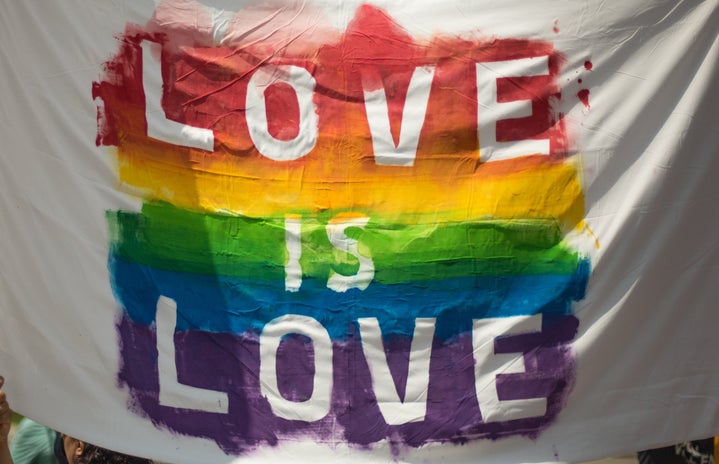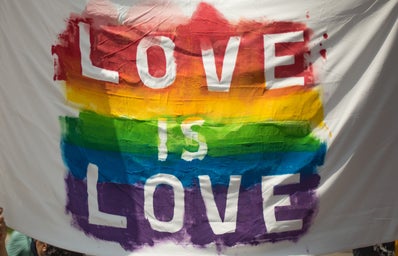Activists are all around us, everywhere we look. Some are more influential than others, and some more direct, but whether it’s a celebrity raising visibility or a protestor outside the Houses of Parliament, there is no doubt that there are far too many activists out there to be counted in a single list. In the area of LGBTQ activism specifically, we’ve had poets and novelists like Oscar Wilde and Virginia Woolf, singers like David Bowie and Elton John, actors like Ian McKellan and Laverne Cox and sports stars like Justin Fashanu and Billie Jean King.
This list is more focused on overt activism; protests, political campaigns and legal change. LGBTQ visibility always has been and will continue to be a large part of growing acceptance and LGBTQ rights, but some people have been more influential than others in the realm of traditional activism.
1. Harvey milk
When I hear the phrase ‘gay activist’, I first think of Harvey Milk. This isn’t to say that others on this list didn’t do just as much for LGBTQ rights (if not more), but as someone who watched the film ‘Milk’ as part of my first dive into gay films, Harvey Milk remains an extremely significant figure.
Harvey Milk was the first openly gay politician to be elected in California, in the year 1977. He was elected following a wave of national homophobic violence, and he campaigned for the support of small businesses, the working-class, and gay people. He led a bill to ban ‘discrimination in employment, housing and public accommodations based on sexual orientation’, which was signed into law in early 1978 and remains one of the strongest LGBT rights measures to this day. He also campaigned strongly against ‘Proposition 6’, which was an initiative banning gay and lesbian teachers and supporters from working in schools, and successfully prevented it from passing.
Milk received frequent death threats throughout his short time as City Supervisor and was assassinated in 1978, 11 months into his term, leaving a legacy of LGBTQ tolerance in San Francisco and the rest of America. Obama awarded him posthumously with a Presidential Medal of Freedom in 2009, alongside the implementation of Harvey Milk Day in California, which occurs on his birthday (May 22nd).
‘I know that you cannot live on hope alone, but without it, life is not worth living. And you…gotta give ’em hope’
-Harvey Milk
2. Marsha P. johnson & sylvia rivera
Johnson and Rivera are both famous LGBTQ activists, who were key figures in the Gay Liberation Movement of the 60s and 70s. They are known for being a part of the famous Stonewall riots in 1969 and are also remembered for their roles as trans women of colour (Johnson was African-American, and Rivera was Latino). Both faced ostracisation for their gender, sexuality and skin colour, and wound up on the streets, and only recently have they begun to become more well-known as part of a move to remove the whitewashing of LGBTQ history.
Rivera especially is remembered for her role in ensuring that trans people remained a significant part of the LGBTQ agenda, even when others within the movement were hostile. Johnson is well-known for her fundraising and assistance of those with AIDs in the 1980s, even prior to her positive diagnosis of HIV in 1990, and her drag act was photographed by Warhol in his 1975 portfolio Ladies and Gentlemen.
Johnson and Rivera went on to found ‘STAR’ (Street Transvestite Action Revolutionaries) which was the first LGBTQ youth shelter in North America, and both continued fighting for gay and trans rights until their deaths in 1992 and 2002 respectively. New York City revealed plans to implement statues for them both in 2019, but nothing has yet come of it, and the only current statue is one of Marsha P.Johnson, put in place by activists.
‘History isn’t something you look back at and say it was inevitable, it happens because people make decisions’
-Marsha P. Johnson
3. Edith Windsor
Windsor came to public attention in 2010, upon taking a case of discrimination against same-sex marriage to the US Supreme Court.
Windsor had been in a relationship with Thea Spyer for 40 years before the pair married in Canada in 2007. They moved to New York, which recognised same-sex marriage, but when Spyer died in 2009, Windsor was ordered to pay $363,000 in estate taxes in order to claim her estate. She claimed the tax exemption given to surviving spouses, but the ‘Defense of Marriage Act’ (DOMA) defined spouse as being the opposite sex, which Windsor challenged as being unconstitutional, and sued the US.
The case went to the Supreme Court, which ruled in favour of Windsor, and thus held that defining marriage federally as ‘between members of the opposite sex’ was unconstitutional and illegal. At the time it only applied to a few states, but activists continued to challenge until in 2015 the Supreme Court legalised same-sex marriage in all states, leading from the decisions made in Windsor vs the US. Windsor continued to advocate for the LGBTQ community until her death in 2017.
‘The wheels of progress turn forward because of people like Edie who are willing to stand up in the face of injustice’
non-western activists
The activists listed above have all been Western, largely because there is more easily accessible data and knowledge on them, but there are many non-Western gay activists as well. LGBTQ issues are far more prevalent in other areas of the world, which can mean that gay activists are not yet widely known of, but that doesn’t make them any less important.
Notable other gay activists include:
- Simon Nkoli- South Africa
Nkoli began as a youth activist against apartheid, and went on to found GLOW (Gay and Lesbian Organisation of the Witwatersrand) in 1988. He co-organised the first South African pride parade in 1990, helped ensure protection from discrimination in the South African constitution, and campaigned for the successful repeal of the sodomy law in 1998. He died of AIDS a few months later.
- Kanako Otsuji- Japan
Otsuji was elected to the Osaka Assembly in 2003 and came out as a lesbian in 2005. She helped to pass legislation to allow same-sex couples to rent housing together in Japan. In 2017 she ran in the general election and became the first openly gay member of the House of Representatives.
- Xulhaz Mannan- Bangladesh
Mannan was employed by USAID in Bangladesh, worked frequently with the LGBTQ community and founded and published the magazine Roopbaan, the only magazine for the queer community in the country. He came out online in 2016 and was murdered by Islamic extremists, who are still facing ongoing trials, and other Bangladeshi LGBTQ activists have continued in his name.
- Alice Nkom- Cameroon
Nkom is a lawyer who often defends people accused of homosexuality, which is illegal in Cameroon. She founded the ADEFHO (Association for the Defence of Homosexuality) in 2003 and continues to advocate for the decriminalisation of homosexuality.
- Zhair Ali- Iraq
Ali is a Kurdish activist who is openly gay, a campaigner for LGBT rights and the founder of Yeksani, an initiative advocating for LGBT+ rights. He raises awareness of LGBT issues and legal loopholes used to detain LGBT people and spoke out against the 2021 Asayish (Kurdish security force) arrests on individuals seen as gay.


